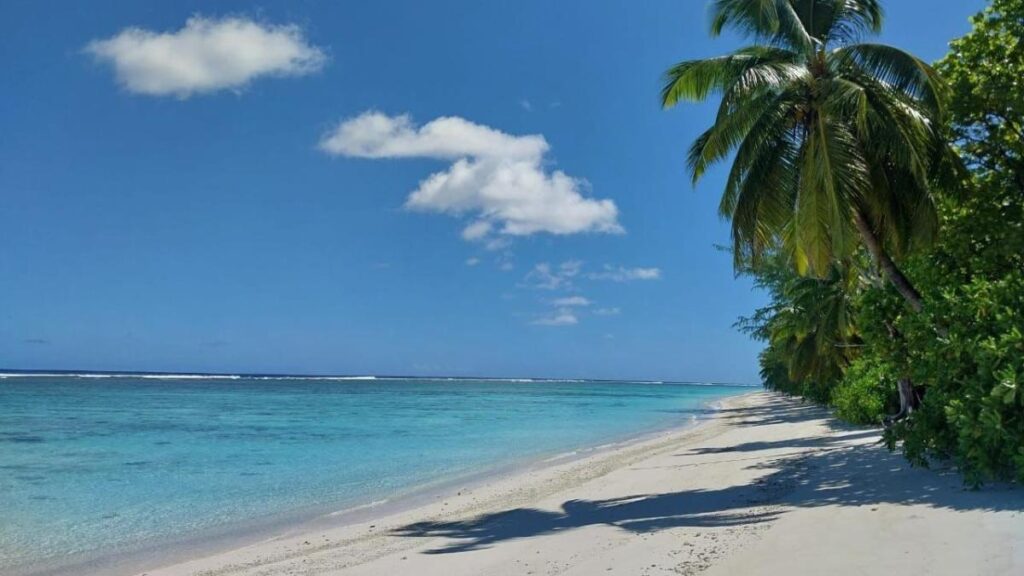Arnaud Poulay’s recent departure from Agalega, a relatively secluded island in the Indian Ocean, signifies a profound shift rooted in concerns over the militarization of his homeland. Until recently, Agalega, inhabited by just 350 residents, was a tranquil fishing community reliant on infrequent food shipments from Mauritius, located 1,100 kilometers to the south. However, the landscape transformed in 2015 when Mauritius entered an agreement with India to construct a substantial 3,000-meter runway along with a large jetty, aimed at enhancing maritime security cooperation. This agreement raised alarms among residents like Poulay, who felt that their island was gradually transitioning from a peaceful haven to a military base, leading to his decision to leave the only home he had known.
The construction of the runway and jetty has drastically altered Agalega’s physical environment, as visible in satellite images that depict a landscape once teeming with palm trees now dominated by infrastructure development. The alterations have sparked fears among locals that the island will transform into a fully-fledged military outpost for India, which already has a notable presence in Mauritius. Poulay, alongside other residents, has led protests against the developments, expressing deep concerns for the future of their community. The new facilities raise essential questions about sovereignty, control of resources, and the future of the inhabitants, as increased Indian military presence could restrict their access to their own land and traditional livelihoods.
Indian military assets, particularly the P-8I maritime surveillance aircraft, further amplify fears among locals who worry about losing their ancestral ties to the island. The existing community is already grappling with the psychological burdens of uncertainty, reminiscent of past tragedies experienced by families who were forcibly relocated from the Chagos Islands under British dominion. These histories of dispossession resonate deeply, making current fears of deprivation starkly poignant. As construction continues and the island’s infrastructure modernizes, the sense of alienation amongst residents grows, leading to a palpable reluctance to accept the changes that inhibit their agency.
While the Mauritius government claims that the new developments aim to bolster socio-economic conditions for Agalega’s residents, many islanders feel left behind. The Malagasy authorities assert that improvements in sea and air transportation could help alleviate poverty, yet locals still face numerous developmental challenges. Services many take for granted, such as reliable healthcare and business opportunities, remain scarce. The creation of facilities that are ostensibly meant for public benefit gains little traction if locals are denied access. Reports indicate a new Indian-built hospital is unavailable to island residents, further entrenching feelings of resentment and neglect.
Despite assurances from the government stating no one would be displaced, rumors circulate regarding the dire implications of militarization for local communities. Many residents contend that restrictions placed on their access to certain areas signal a move toward marginalizing the local population. Laval Soopramanien, leading a local association, expressed concerns that the village of La Fourche might be engulfed by Indian-led construction, ultimately displacing its inhabitants. These sentiments reverberate throughout the community, as many individuals fear a repeat of historical injustices where they would be uprooted from their homes in favor of foreign priorities.
The lack of transparency surrounding the agreement between India and Mauritius fuels distrust among the Agalegans, exacerbating their fears of exploitation and dislocation. Residents have not been privy to specific plans regarding the island’s transformation, aggravating existing uncertainties. Prime Minister Pravind Jugnauth’s commitments to enhance the living standards on Agalega through a “master plan” appear hollow amidst these circumstances. Without clear communication and genuine investment in the needs of the local population, there is skepticism that promises materialize into reality. As tensions rise and discontent grows, the situation in Agalega underscores the delicate balance between national security and local aspiration, as well as the importance of protecting the rights of residents in the face of significant geopolitical interest.

